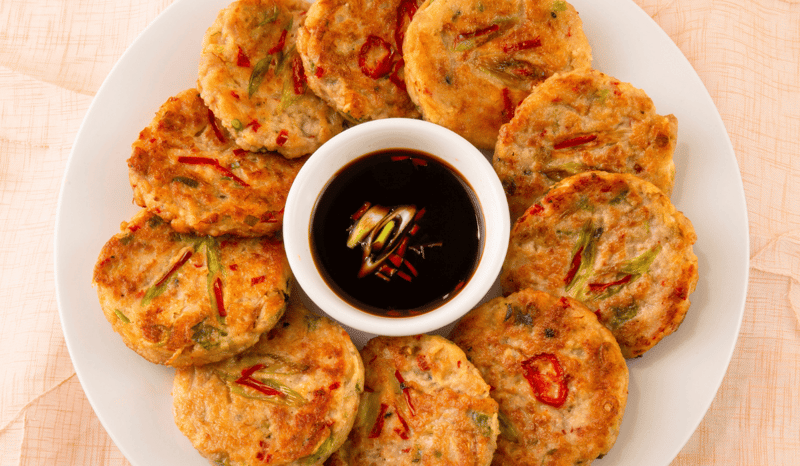
I made (and loved!) these five recipes that show how we can honor traditions while leaving animals off our plates.
Asian American and Pacific Islander (AAPI) Heritage Month is a time to honor the rich cultural contributions, traditions, and stories of the AAPI community. In the weeks leading up to it, I wanted to celebrate the incredible individuals who are sharing their cultural heritage through plant-based food. I made (and loved!) these five recipes that show how we can honor traditions while leaving animals off our plates.
Here’s what I made:
1. Bindaetteok: Korean Mung Bean Pancakes
My month started off strong because these Korean pancakes by Joanne Lee Molinaro (@thekoreanvegan) were absolutely delicious! They are crispy on the outside and soft and chewy on the inside. I love that they’re protein-packed with mung beans as the base. You can order mung beans online, but be sure to soak them overnight so they’re soft and ready to go. I learned that Bindaetteok is a holiday dish, often prepared for Chuseok, Lunar New Year, or other traditional holidays.
Joanne is known for blending personal storytelling with traditional Korean cooking. Her recipes are deeply personal and heartfelt, and this one delivered.
2. Dan Dan Noodles
These Dan Dan noodles from Hannah Che (The Plant-Based Wok) were so flavorful. I didn’t have soy curls on hand, so I swapped in crumbled extra-firm tofu (a substitution Hannah suggests). I also don’t tolerate spice well, so I used less chili oil than the recipe called for, but it didn’t compromise the flavor. Still amazing!
The name Dan Dan comes from the traditional carrying pole that street vendors in Sichuan used to transport and sell this dish. They’d balance the pole over their shoulders with baskets of noodles and sauce hanging from either end. People began calling it “Dan Dan noodles,” which literally means “noodles carried on a pole.”
Hannah’s cooking is rooted in her Chinese heritage and culinary training. She makes traditional dishes approachable and beautifully plant-based.
3. Taiwanese Tofu “Pork Chops” (Pai Gu Fan)
I’ll definitely be making these tofu “pork chops” again! It’s perfect for a quick weeknight meal. The cornstarch coating on the tofu ‘steaks’ gives them a satisfying crispiness, and it feels like a versatile recipe—you could easily toss in whatever veggies you have on hand. According to the recipe’s creator, Remy Park (@veggiekins), Pai Gu Fan is a popular street snack and convenience food found throughout Taiwan. While traditionally made with pork, Remy shows we can still enjoy all the savory, sweet, and tangy flavors without any animal products!
Remy shares recipes inspired by her Asian roots and wellness journey. She’s Korean, Japanese, and Taiwanese, so many of her recipes are influenced by her parents’ ethnicities.
4. Filipino Pancit Bihon
I had Pancit while visiting the Philippines last winter and found out it’s a dish often made for gatherings, but just as common for weeknight meals. I’d been wanting to recreate it at home, so I was excited to find this vegan version by Jasmine Briones (@sweetsimplevegan). The recipe was quick, flavorful, and made for delicious leftovers the next day.
Jasmine’s recipes are full of love for her Filipino heritage. Her plant-based versions stay true to the soul of each dish.
5. Palak Paneer
I’ve always loved Palak Paneer, and this plant-based version by Nisha Vora (@rainbowplantlife) definitely hits the mark. The spinach curry is packed with spices and flavor. Nisha offers two methods for preparing the tofu ‘paneer,’ and I chose the boiled version, which gave it an almost cheese-like texture. This will be added to our regular rotation for dinners!
Nisha Vora is the creator behind Rainbow Plant Life. A former lawyer turned full-time food blogger, Nisha brings passion and precision to every dish, making plant-based cooking both exciting and accessible. Her recipes are known for bold flavors, thoughtful techniques, and beautifully layered ingredients.
Cooking these dishes reminded me that food is more than just fuel—it’s a language. It’s how we connect to our cultures, our histories, and to each other. I’m grateful to these creators for sharing their recipes, and I hope you’ll try one (or all!) of them this month.
Let us know if you make any by tagging us on social! We’d love to hear what you think.